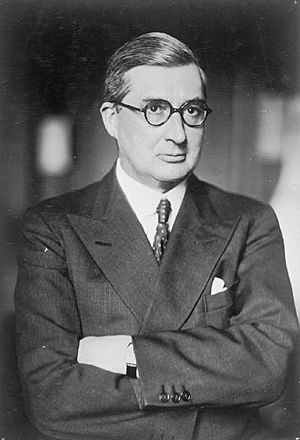James Grigg facts for kids
Quick facts for kids
Sir James Grigg
|
|
|---|---|
 |
|
| Secretary of State for War | |
| In office 22 February 1942 – 26 July 1945 |
|
| Monarch | George VI |
| Prime Minister | Winston Churchill |
| Preceded by | David Margesson |
| Succeeded by | Jack Lawson |
| Member of Parliament for Cardiff East |
|
| In office 13 April 1942 – 15 June 1945 |
|
| Preceded by | Owen Temple-Morris |
| Succeeded by | Hilary Marquand |
| Personal details | |
| Born | 16 December 1890 Exmouth, Devon |
| Died | 5 May 1964 (aged 73) |
| Nationality | British |
| Alma mater | St John's College, Cambridge |
Sir Percy James Grigg (born December 16, 1890 – died May 5, 1964) was an important British government official. He was often called P J Grigg or Sir James Grigg. During World War II, he took on a very important job. He became the Secretary of State for War, which meant he was in charge of the War Office. This was a big surprise because he was a civil servant, not a politician. Winston Churchill, who was the Prime Minister, personally asked him to take this role.
Contents
Early Life and School
James Grigg was born in Exmouth, a town in Devon, England. His father, Frank Alfred Grigg, was a carpenter. James was very smart and won scholarships to attend Bournemouth School. Later, he went to St John's College, Cambridge. There, he studied mathematics and did extremely well, earning top grades.
Working for the Government
In 1913, James Grigg took a special test for the British Civil Service. He came in first place! This meant he got a job working for the government at the HM Treasury. The Treasury is like the country's money department.
During and after World War I, he worked closely with different government leaders. One of them was Winston Churchill, who would later become Prime Minister. Grigg then became the head of the Board of Customs and Excise. This group collects taxes on goods. He also led the Board of Inland Revenue, which collects income taxes.
In 1934, Grigg moved to New Delhi, India. He became the Finance Member of the Government of India. This was before India gained full independence. He stayed there until 1939. Even after returning to Britain, he continued to advise on policies about India. This was especially true when Winston Churchill became Prime Minister. In 1939, Grigg became the top civil servant at the War Office. This department was very busy during the war.
Leading the War Office
In February 1942, something unexpected happened. Prime Minister Churchill decided to replace the current Secretary of State for War. He chose James Grigg for the job. This was a big shock because Grigg was a civil servant, not a Member of Parliament. Churchill made this choice because Britain was facing tough times in the war. For example, Singapore had just fallen to enemy forces. Churchill needed strong leaders to help the country.
Grigg proved to be a very good leader for the War Office. He kept his job for the rest of World War II. He even stayed on during Churchill's temporary government in 1945. In 1942, he was elected as a Member of Parliament (MP) for Cardiff East. This meant he now had a political role as well.
However, in the 1945 United Kingdom general election, Grigg lost his seat in Parliament. After this, he decided to retire from public life.
Life After Public Service
After leaving government, James Grigg joined the boards of several large companies. He worked for companies like the Imperial Tobacco Company and the Prudential Assurance Company. He also became the first British executive director of the International Bank for Reconstruction and Development in 1946. This bank helps countries rebuild after wars.
Sir James Grigg passed away on May 5, 1964, when he was 73 years old.
Family Life
James Grigg married Gertrude Charlotte Hough in July 1919. She was the daughter of Reverend George Frederick Hough. They did not have any children.
His Own Story
- Grigg, James. Prejudice and Judgment. Jonathan Cape, 1948.
 | William M. Jackson |
 | Juan E. Gilbert |
 | Neil deGrasse Tyson |

